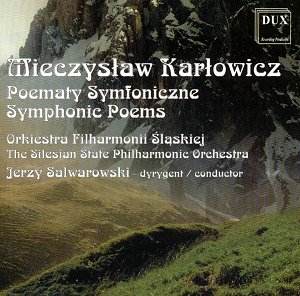This set was once available
on Chant du Monde and its repackaging
here – a 2 CD set with excellent notes
and documentary material and in idiomatic
performances – makes it a locus classicus
of the current Karłowicz discography.
The tragically short-lived composer,
killed on the Tatra Mountains in an
avalanche, was a composer with an intense
appreciation of nature and of complex
psychology – late Romanticism with a
powerfully Tchaikovskian cast
and Straussian rhythmic and melodic
snap. This is merely to attempt a broadly
generalised musical stamp of this adherent
of the ‘Young Poland’ movement. The
tone poems were all written in the last
five years of his life and are representative
of some of the finest orchestral music
of their type.
Recurring Waves
was written on the Adriatic coast in
1904 and first performed under the composer’s
direction in the same year in Warsaw.
It has as its root a Turgenev short
story and spans reflection, refraction
and loss with some orchestral mastery.
The bass clarinet and horn calls are
allied as much to darkening Tchaikovskian
rhetoric as to Sibelian chill. Out of
the shuddering strings a solo trumpet
takes on an obscure but profound brassy
psychology, whilst the noble direction
of the string cantilena and its admixture
of Wagnerian-Straussian elements culminate
in reflective intimacy – quiet strings
and solemn winds and a strong sense
of the narrative having run its course.
Eternal Songs (1904-06, first
performed
in Berlin by Karłowicz proponent,
the conductor Grzegorz Fitelberg) is
in three movements. The first is full
of power and drama with some eruptive
and effulgent writing whilst winding
Delian string melodies enrich the second.
As indeed does the slashing storm
tossed writing and the hieratic Parsifalian
unfolding, pantheistic and brilliantly
climaxed. The last of the pieces is
rhythmically snappy with punchy brass
writing. Throughout there is, as ever
with this composer, a sense of narrative
expectation, something the burnished
brass and answering string go some way
in resolving. The Sorrowful Tale,
his last completed work, is a long
limbed and gloomy with the most subtly
revealing exchanges between wind and
string choirs.
The Lithuanian Rhapsody
seems to be predicated on somewhat
Sibelian lines with its sense of evolutionary
development and movement. The central
part of the tone poem becomes increasingly
mellow which in turn announces a brusque
start to folksier music. There is plenty
of rustic sounding charm
here which acts as a good contrastive
device and the work ends with the violins
playing very high up the fingerboard,
a chill modulated and warmed by the
generous sound of the bass clarinet.
Karłowicz called Stanislav a
Polish travesty of Romeo and Juliet
but it seems there was some psycho-biographical
element behind it, reflective of his
own youthful and thwarted love for his
cousin Ludka. The buoyant optimism of
the opening paragraphs is misplaced,
the tone poem darkening and coiling
into moments of intense introspection
and externalised horror. For all the
surging of the strings, the immutability
of the brass flings down its own implacable
charge; little motivic threads lead
to a brief march theme but the game’s
up for the doomed brother and sister,
as the veiled reminiscences from Tristan
and Die Walküre only
serve to underline. Episode from
a Masquerade written, but
not completed, in his beloved Zakopane
was finished and first conducted in
1914 by the loyal Fitelberg. Again there’s
a surging confident start but once more
the narrative darkens. Hollow horns
echo, a degree of phantasmagoria develops
before at 9.35 a beautiful string melody
emerges; the drama is complex once more,
internalised and constantly shifting.
The musical means of expression here
decisively embrace Strauss, whose Til
Eulenspiegel seems constantly to be
about to explode over the fabric of
the score.
These are powerfully
impressive performances of works that
need a strong and idiomatic conductor
to mediate their often baleful curve
and they have one here. The recorded
sound is very occasionally a little
opaque but one can listen with pleasure
to the tone poems – and with confidence.
The booklet notes are full and very
well written and argued. This is a genuinely
important set and I recommend it.
Jonathan Woolf
See also review
by Rob Barnett
